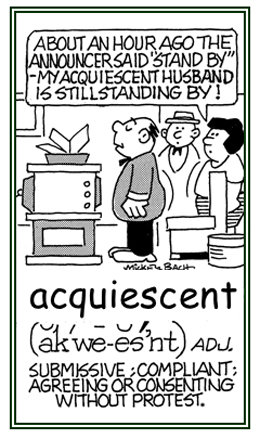-ent
(Latin: adjective suffix signifying action or being; performing a particular acion)
Abducent muscles refer to the movements of one part of the body away from another section.
The abducent nerve originates in the pons, or part of the brain stem, and emerges from the brain immediately below it, then, from this point, it extends through the skull, eventually entering the back of the eye socket through a space between the skull bones.
Ronald's sister had an abhorrent dislike of insects and other "creepy things" which helped to determine the direction of her scientific studies.
2. Pertaining to an occurrence that is incompatible with or conflicting with something: The abhorrent violence at the start of the film was so disgusting and loathsome that the couple got up and walked out.3. Abominable, repugnant, or despicable: The man committed an abhorrent crime when he killed his wife.
4. Unacceptable or regarding a strong dislike: The thought of not being successful with his performance at the tennis match was abhorrent to the player.
The spelling of abhorrent shows that it is related to "horror". It means "feeling horror", when it is used with "of": Niki was so abhorrent of snakes that she would almost faint if she simply saw one.
When abhorrent is used with "to", it is expressed as: Crystal's casual disregard for the truth was abhorrent to her father's moral values.
When abhorrent means "creating horror, detestable", then it is written as: The sight of the abhorrent bleeding and injuries particularly upset Latricia when she saw those who were so terribly hurt in the car accident.


Go to this Word A Day Revisited Index
so you can see more of Mickey Bach's cartoons.
There are usually several different abluents available in supermarkets that are used to clean all kinds of things in one's home.
2. An agent that causes the soaking up or the taking in of liquids by solids: Adding the right kind of absorbefacient to the spill on the garage floor made it easier to clean up the mess.
2. Pronunciation, enunciation, or modulation of speech: The famous movie actor speaks with a French accent.
3. A hint, a touch, a detail: The room was painted white with just a slightly green accent.
The ascent to the top of the mountain was difficult for Jared, Adrian, and Javier.
2. Incline, slope: The road made a sharp ascent to the top of the hill.3. Advancement, progress: Marie's parents were amazed about her ascent from being a secretary to becoming president of the company in just five years.
Romeo was willing to assent to Juliet's request that he come again.
With the assent of the board of directors, the new board room was painted green with an accent or two of white highlighting the ascent of the ceiling to the skylight in the center.
A three-car accident tied up the highway traffic for five hours.
2. In law, a situation resulting in injury that is in no way the fault of the injured person for which compensation or indemnity is legally sought: The lawyer explained that the accident involving her client was not his fault and he should not be charged by the police.3. Any event that happens unexpectedly, without a deliberate plan or reason: Tamika met her best friend purely by accident when she was shopping at the Farmers' Market.
4. By chance; fortune; luck: Sam arrived just in time for a meeting by accident because he didn't know when it was supposed to start.
5. A fortuitous circumstance, quality, or characteristic: It was a fortuitous accident that the house that Jake bought was on the north side of the street so his children could go to the school just across the park.
6. Etymology: "an occurrence, an incident, or an event"; from Old French accident (12th century), from Latin accidentem, accidens, accidere, "to happen, to fall out, to fall upon"; from ad-, "to" + cadere, "to fall".
Fred's cat was having a more accumbent rest on the rug in front of the fireplace.
2. In botany, lying or leaning against something; such as, cotyledons or embryonic leaves in seed-bearing plants: The botanist was studying the growth patterns of accumbent seedlings of various cotyledons.2. The act of achieving; attainment or accomplishment.
3. In heraldry, the full display of the armorial bearings (bearing a coat or coats of arms) of an individual or corporation.
2. Concerning a person who is slightly sour; peevish: On hearing the news about her brother's engagement, June's face took on an anxious and acidulent expression.
2. Etymology: from Latin acquiescere, "to remain at rest" or "to become quiet".


